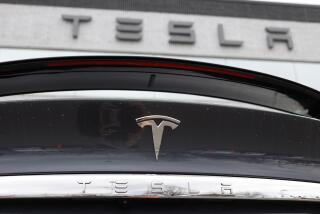Ex-prosecutor will be Toyota’s independent safety monitor, U.S. says
- Share via
The Department of Justice appointed David Kelley, a former U.S. attorney, to serve as the independent safety monitor at U.S. operations of Toyota Motor Corp.
Kelley’s position is part of the automaker’s agreement reached with federal prosecutors in March that also included a $1.2-billion fine. The deal settled a four-year federal criminal investigation into whether Toyota properly reported safety complaints about sudden acceleration of its vehicles.
Toyota was formally charged with one count of wire fraud, but if it abides by the settlement terms, the Justice Department will defer prosecution for three years and then seek to dismiss the charge. The case focused on reports of floor mats jamming gas pedals and of gas pedals getting stuck on their own.
“We intend to have a cooperative and constructive working relationship with Mr. Kelley, with the goal of making Toyota an even stronger company,” said Julie Hamp, Toyota’s senior spokeswoman in North America. “In our view, this is an opportunity to build on the important changes we have made over the past four years to serve our customers better.”
Kelley said he has already started to meet with Toyota. “It is a long road ahead,” he said. “If you look at the deferred prosecution agreement there is a lot of ground to cover.”
The agreement gives Kelley broad powers to hire staff and to review Toyota’s policies, practices and procedures for communicating safety issues both internally and to the public and regulators. Under terms of the agreement, Toyota must pay Kelley and his staff standard consulting fees and rates.
Kelley is a partner at the New York law firm of Cahill Gordon & Reindel, where he is a specialist in regulatory and enforcement actions involving business crime. Before joining the firm nine years ago, Kelley was the U.S. attorney for the Southern District of New York, where he supervised prosecutions involving white-collar crime, securities fraud and international terrorism.
Regulators have demanded wholesale changes in Toyota’s recall process as a result of their investigation into the automaker’s safety procedures.
At the time of the March settlement, George Venizelos, assistant director of the FBI, said, “Toyota put sales over safety and profit over principle. The disregard Toyota had for the safety of the public was outrageous.”
Hamp said Toyota has taken a series of “substantive actions” to improve its safety operations since it recalled millions of vehicles in 2009 and 2010.
For example, the auto company has extended its new-vehicle development cycle by four weeks to help ensure reliability and safety, she said.
It established teams to investigate customer concerns quickly. Toyota committed to spend $50 million on a safety research center in Ann Arbor, Mich., that will partner with universities and other institutions to share safety information.
Toyota also expanded its network of field quality offices to improve customer responsiveness. In a move to create more autonomy for its U.S. operations, Toyota named longtime sales executive Jim Lentz to be the first American chief executive of Toyota’s North American region.
The huge Toyota fine and deferred-prosecution agreement are part of an increase in auto-industry oversight by regulators. At the same time, automakers are jumping on recalls quickly and going back and recalling cars that could have been recalled for safety reasons earlier in their life cycles but weren’t.
The industry has called back 46 million vehicles in the U.S. so far this year, according to automaker and National Highway Traffic Safety Administration reports. That amounts to nearly one in five light vehicles on the road and eclipses the annual recall record of 30.8 million set in 2004.
“There is certainly a lot going on in the industry,” Kelley said, adding that he believes other automakers are watching to see how the Toyota agreement proceeds.
Last week, Hyundai agreed to pay a $17-million federal fine for failing to promptly report a brake problem in Hyundai Genesis cars.
Hyundai agreed to make some of the same changes that Toyota has made in its operations.
For example, Hyundai signed a consent decree promising to make improvements to its processes for identifying, reporting and communicating safety-related defects. It will create a U.S.-based technical committee to review and make decisions regarding potential Hyundai-specific safety recalls, the NHTSA said.
Hyundai also is adding staff to review potential defects and complaints. The automaker said it plans to meet with NHTSA on a regular basis regarding safety issues.
Also earlier this year the NHTSA fined General Motors Corp. its maximum $35 million for delays in recalling vehicles with faulty ignition switches that have been linked to 13 deaths.
GM remains under investigation for delaying recalls by the NHTSA, the Justice Department and Congress and could face more fines and the prospect of an agreement similar to the one Toyota signed with the federal government.
Follow me on Twitter (@LATimesJerry), Facebook and Google+







